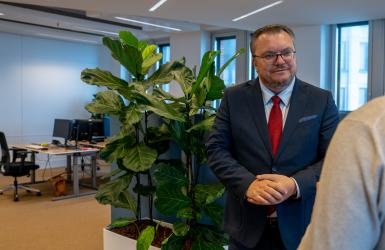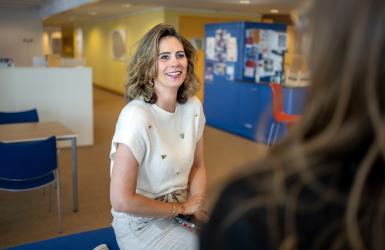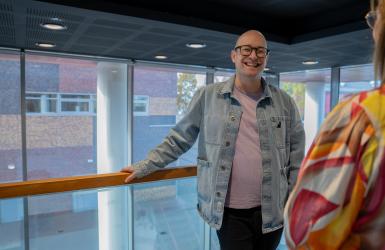The story of Diederick, corporate lawyer
‘We are the legal conscience of the IND’ Anyone who thinks the IND begins and ends with decision-making staff members is only seeing half…

It does not matter where you were born or what you look like. Anyone can end up in a situation in which you have to flee.
The Family Reunification Department of the IND is occupied with the family members of people who have obtained asylum in the Netherlands. 'If people have a right to this and comply with the law and regulations, then we grant a permit to the family members who are able to come to the Netherlands”, says Sharon. “A permit holder can have for example his or her marriage or other partner come here. If there are children or foster children, they will also qualify. And if the permit holder is an unaccompanied minor, then the parents can also journey to the Netherlands in connection with family reunification.'
After her Master’s Degree Programme in International Development Studies, Sharon ended up at the IND purely by coincidence. 'I was had actually just started to explore various jobs when I saw a nice vacancy. The IND has a strongly international component, which was nicely in line with my development cooperation programme. In March 2020 I came to work at the organisation as a temporary worker. Initially as scheduler at the IND at Schiphol, but I quickly applied internally for the job of interview and decision-making staff member. I was engaged, underwent the training and started at the Asylum Department, also at Schiphol.'
Although Sharon had the feeling that she liked interviewing and decision-making, she did not feel very much in her place at asylum. 'It was not entirely what I was looking for. Fortunately there are extremely many career opportunities at the IND and I was quickly able to move to the Family Reunification Department.'
One of the applicants that Sharon will never forget was a girl who had arrived in the Netherlands after evacuations from Afghanistan. Sharon: 'It was a very odd sensation, we were like two peas in a pod. Not only with respect to appearance and age. For example, she worked at the Embassy in Afghanistan, while shortly before I was still doing a traineeship at a consulate. We both proved to have done volunteer work in relation to women’s rights. It was as if I were looking in the mirror. And that was a moment of realisation for me. It does not matter what your education is, where you were born or what you look like. Anyone can end up in a situation in which you have to flee. And in that case, ultimately you simply want to be together with your family again.'
The IND has a lot of searching and other work to do on almost every application for family reunification. Is the identity of the family members correct? Are the foster children entered actually foster children? Have the biological parents given permission to allow them to travel to the Netherlands? Does the applicant meet the requirements for a journey in connection with family reunification? 'And there is still a very long list to be sorted out', says Sharon. 'The theme of every workday for me is collecting answers and gathering new information, so that I will ultimately be able to take well-considered decisions on the files.'
Help people – that was what Sharon wanted to do after her studies. This helpful and service providing institution often made it difficult for her during her first months as an interview and decision-making staff member to reject an application. 'Rejecting someone… that certainly did not feel like helping people. 'In the meantime she feels differently about this. 'I decide whether people qualify for family reunification. I make this assessment each time with the applicant’s personal story in my heart and Dutch policy on my mind. ‘I know now that a negative decision is also a decision. And it sees to it that people do not have to wait longer in uncertainty, but can take the next step in their lives.'

‘We are the legal conscience of the IND’ Anyone who thinks the IND begins and ends with decision-making staff members is only seeing half…

'Healthy and happy staff' When Evelien joined the IND in 2016, she only planned to spend two years here to gain experience.…

‘A single conversation can change someone’s day, week, or even their life’ Anyone who contacts the IND with questions about an application, a residence permit, or…